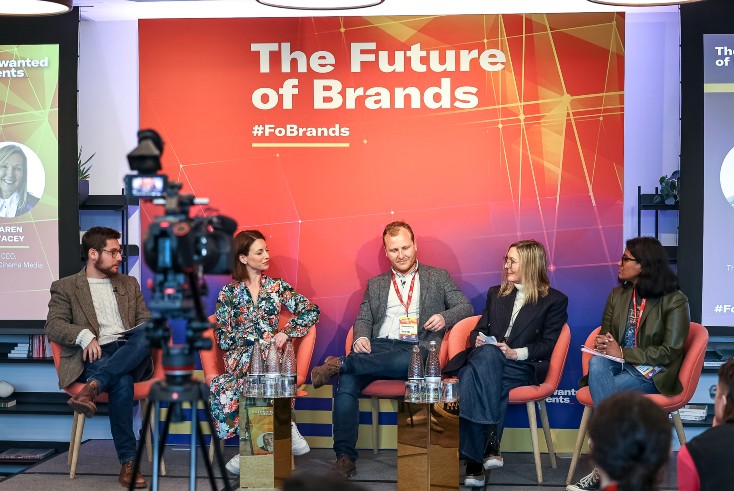What is the biggest driver of effectiveness?

“The ability to test, learn, understand what works, and adapt rapidly—because so much is changing so quickly all the time—is really key.”
That was one key insight on how to drive effectiveness in the current fast-paced media environment from Dentsu media agency iProspect’s head of UK strategy Grace Letley, who spoke as part of a wide-ranging panel discussion at The Future of Brands 2023 in April.
Joining Letley at the London-based panel were Karen Stacey, CEO of Digital Cinema Media (DCM) and 2023 Media Leader of the Year award winner; Tom Hallett, head of UK econometrics at Sky; Venya Wijegoonewardene, SVP of strategy & planning at Brainlabs; hosted by The Media Leader.
Increased time pressures for effectiveness teams was an important discussion point. As Stacey noted, “we’re much more fleet of foot as an industry,” and with that comes added pressures to measure effectiveness quickly.
Media planning and creative are going to become closer
According to Wijegoonewardene, as the industry speeds up and creative can be developed faster with the help of new technology, such as generative AI, there will be more onus on media planners to “lead the charge” to better help creative agencies improve ad effectiveness across different environments.
“We have more tech available to help us navigate that, but I think as planners our job is to really understand what is insight, what are we helping creative agencies navigate and create creative that works in multiple different contexts,” she said.
Hallett agreed, noting during the discussion that sometimes discussions about media effectiveness “feel a little disjointed from creative” when that should not be the case. The panel was in universal agreement that exceptional creative drives effective media. But, as Hallett noted, there is often a disconnect between effectiveness teams and planners at media agencies and creative leads at creative agencies.
Stacey said she has noticed a move toward more “effective creative” amid cost-of-living crisis pressures, especially in digital markets, and expects more development in this area.
The ongoing development of using artificial intelligence in media planning should help free up the time and space to take a more active role in aiding creative strategy across different platforms, according to Wijegoonewardene. “The role of the media planner is actually more critical in the world of automation because it allows you to spend more time making those strategic decisions and less time on menial, repeatable tasks,” she added.
‘Not all our impressions, impacts, and views are equal’
Attention measurement was discussed by each panellist as a key potential driver for effectiveness.
Dentsu, Sky, and DCM have all partnered with attention measurement company Lumen Research recently to help better understand the attention received across different media campaigns. Letley spoke about how Dentsu is “baking [attention] into our tools”. For example, in March Dentsu announced an update to its extant Effective Attention offer, which now integrates attention measurement with carbon measurement to aid media decarbonisation and effectiveness efforts in tandem. Other agencies, like IPG Mediabrands’ Mediahub, have sought similar solutions for advertisers.
Podcast: Attention measurement is ‘once-in-a-lifetime chance to make a killing’
Hallett also discussed how Sky has worked to overlay attention data on top of its media reporting metrics, and feed it through into its econometrics models. “Not all of our impressions, impacts, and views are equal,” said Hallett, underscoring the growing importance of attention.
Attention’s importance for cinema advertising was brought up by Stacey as offering a unique proposition. Cinema ads outperform ads placed in other media when measuring for attention, thanks in part to its large screen distraction-reduced environment. But Stacey also added media owners can use metrics like attention to narrow the scope of their sales pitch to clients.
“There’s a lot of claiming that everyone can do everything, which is obviously not true,” she said. “It’s really important for media owners to be clear about what they’re good at.”
For Stacey, effectiveness is driven both by great creativity and attention given by consumers. She added she was a fan of Richard Kirk’s “Right Reach” model, which argues that attention, persistence and relevance (in that order) are key to driving effectiveness.
The importance of effectiveness in a cost-of-living crisis
Hanging over the conversation were ongoing concerns regarding the cost-of-living crisis. With macroeconomic uncertainty persisting well into 2023, effectiveness has been seen as key to arguments to maintain investment in advertising budgets.
“More than ever at the moment, when there’s a really high level of scrutiny on budgets as a result of the financial crisis, we’re being asked to prove out that our performance and our brand marketing is working,” said Hallett.
Podcast: Why ‘Right Reach’ is needed in a fragmented media world
Wijegoonewardene noted that clients have had “more of a performance mindset being applied to brand” because they’re having to defend to their CFO why that brand investment should stay there. “We’re seeing a real shift on our more brand-led clients adopting more of that testing-led approach, but also having to prove out through things like incrementality testing and more agile versions of econometrics that actually yes our brand spend is delivering X today but also Y tomorrow.”
For those willing and able to invest amid the downturn, Letley argued the crisis could offer a significant opportunity for brands to grow their share of voice.
Quoting a McKinsey report, she added: “You can’t overtake 15 cars on a dry day, but you can when it’s raining.”




